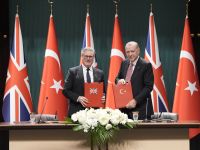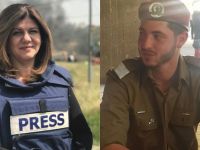Iranian President Mohammad Khatami on Monday blasted the "unacceptable" mass closures of Iranian newspapers, most supporting his reform program, in his strongest statement to date on the crackdown.
In a wide-ranging interview about his tenure in office being broadcast over several days by state television, Khatami said the conservative courts had used unsuitable methods in muzzling the Iranian press.
"I don't agree with the methods used ... or the wholesale closure of the papers," Khatami said in the interview, conducted by local journalists including the head of the state IRNA news agency, Fereydoun Valinejad.
"Their methods must be adequate and acceptable to the people and especially those in the journalistic profession," the reformist president said.
Every major pro-Khatami newspaper has been shuttered since reformists won control of parliament in February's elections, and several Khatami allies and high-profile journalists have been jailed.
The closures have marked an often-bitter battle between his reform supporters and the regime's conservatives, who control the state media and the police as well as the judiciary.
Khatami also revealed that he had threatened the clerical regime he would "tell all" unless it agreed to a special inquiry into the 1998 killings of several dissidents and intellectuals.
"It was a tough blow and I told everyone that I would announce to the Iranian people that I have no power and I am finished," Khatami said, adding that supreme leader Aayatollah Ali Khamenei thereafter agreed to the investigation.
After the inquiry the intelligence services acknowledged the murders had been the work of several "rogue" agents but denied any top officials were involved in the killings, which sparked protests both here and abroad.
The alleged leader of the network, Said Emami, was said to have committed suicide in prison while the national intelligence chief at the time, Ghorbanali Dorri-Najafadi, was replaced.
Some 22 other people were acquitted in April as the courts announced there was insufficient evidence linking them to the killings.
Khatami also said that an investigation lanuched by his own office into six days of bloody riots last year, set off when police attacked student demonstrators, had been brushed aside by the courts.
"The conclusions of the presidential inquiry were not really taken into account," he said.
The protesters, demonstrating against the closure of a pro-Khatami newspaper, were attacked by police and Islamic vigilantes at Tehran University.
"A shot was fired. We had to know who fired the shot," Khatami said, charging that the courts had only taken into consideration "part" of the facts surrounding the disturbances.
Three people were killed, according to the official version of the unrest, while reformist newspapers -- most now closed -- said dozens of people had also been wounded and later abducted from hospital by the secret police.
Khatami nevertheless said he was "satisfied" with the cooperation between the police, which are under the direct control of Khamenei, and the government in the investigation into the affair.
An Iranian military court in July acquitted the former chief of Tehran's police and 17 colleagues in connection with the attack, prompting reformists to charge the court had delivered a political verdict.
Khatami, who is facing a re-election battle next year without the support of the now-banned reformist press, also vowed that he would not step down from office despite the fight over his reform program.
State television will broadcast the second part of the president's interview on Tuesday - TEHRAN (AFP)
© 2000 Al Bawaba (www.albawaba.com)







